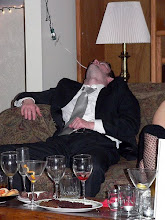 |
| This is what happens when you go mainstream, Richard. |
Make no mistake: Return of the Jedi this is not. Nor was it ever intended to be. The Superman films in the 1980's, in fact, can more directly be compared with, say, those James Bond films, where each installment is just sort of a new thing that happens. The connection to James Bond is a telling one, for me, and not just because of Peter Murton, who served as the Production Designer for this film as well as The Man with the Golden Gun, and as Art Director for both Goldfinger and Thunderball.
 |
| "I have no plans. No evil schemes at all." |
Superman III stands in contrast in particular to the first of the Christopher Reeve films and its grandiose American mythmaking. It's compared unfavorably to its immediate predecessor for the same reason. When people remember Superman II, I think they tend to remember bits of it. The Diner. Zod in the White House. The fight. The reversal. What I suspect gets overlooked or glossed over are the constant ways in which the action in Superman II, particularly in the climactic fight between Superman and the Phantom Zone villains, is undercut by little twinges of Richard Lester's idea of comedy. Superman II is a film at war with itself.
To recap: Superman: The Movie and its sequel were filmed concurrently, with an eye for releases closer together than what the public eventually got. As the budget and shooting schedule got out of control, however, producers Alexander and Ilya Salkind pressed Richard Donner to at least get the first film done. Eventually, Donner and the Salkind's got into a public row over Superman II, resulting in Donner being sacked and replaced with Richard Lester.
It's not as though Donner's first film is devoid of any humor. There's a wry light-heartedness to Superman himself, and Lex Luthor is played as a camp figure, as performative and faintly ridiculous as he is affably menacing. But Lester's version doubled-down on the jokes, with numerous reshoots changing the depth of the shots as well as a general peppering throughout of little off-hand gags, which, in the particular case of Zod et. al.'s assault on Metropolis, manage to thoroughly drain that scene of any of the tension or horror you might expect from three people who can bench-press a city going to town on a human populace.
 |
| "People, people, please! Just because it's a dramatic scene doesn't mean you can't do a little comedy in the background!" |
The original film owes much to Batman. The villain set-up: well-known actor, henchman, mol, are a Superman-themed palate swap from Batman's rogues as they appeared on that program. The only difference between Gene Hackman in Superman and Frank Gorshin in Batman is Hackman's Luthor only has the one henchman, and no brightly-colored knock-out gas. It's a trend that continues here, though Robert Vaughn's Ross Webster owes more in his DNA to a James Bond villain than Lex Luthor, at least as Luthor was portrayed prior to 1986.
Comic books, and in particular comic book adaptations, have had an uneasy relationship with camp, particularly in relation to that Sixties TV show, and how it shaped the mass audience's perception of superheroes for almost fifty years. Batman existed in the frisson between ideas that were originally geared toward children and the adult sensibilities of the parents watching that show with their kids. Indeed, Superman III is only two years out from titanic shifts in the comic book industry that were, in large part, a reaction to the continued perception of comics as a children's medium.
The Superman film franchise sputtered with its third outing and nearly came to a halt. And while I'd hesitate to call this film "good," exactly, Superman III gets a bum rap for bringing such a tonal whiplash to the franchise. In today's era, where superhero films are so thick on the ground it's hard not to trip over them, the film might have fared better, simply for the variety it brings, the lack of pompous self-seriousness that informed other superhero films, both flops and successes.
If nothing else,that Brainiac scene at the end gave me nightmares as a kid.
 |
| See Also: Goldfinger, Stromberg, Drax, Zorin |
Comic books, and in particular comic book adaptations, have had an uneasy relationship with camp, particularly in relation to that Sixties TV show, and how it shaped the mass audience's perception of superheroes for almost fifty years. Batman existed in the frisson between ideas that were originally geared toward children and the adult sensibilities of the parents watching that show with their kids. Indeed, Superman III is only two years out from titanic shifts in the comic book industry that were, in large part, a reaction to the continued perception of comics as a children's medium.
The Superman film franchise sputtered with its third outing and nearly came to a halt. And while I'd hesitate to call this film "good," exactly, Superman III gets a bum rap for bringing such a tonal whiplash to the franchise. In today's era, where superhero films are so thick on the ground it's hard not to trip over them, the film might have fared better, simply for the variety it brings, the lack of pompous self-seriousness that informed other superhero films, both flops and successes.
If nothing else,that Brainiac scene at the end gave me nightmares as a kid.
 |
| Fucking. Terrifying. |




No comments:
Post a Comment